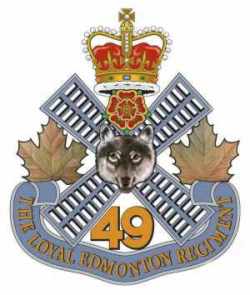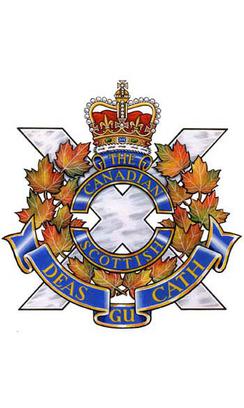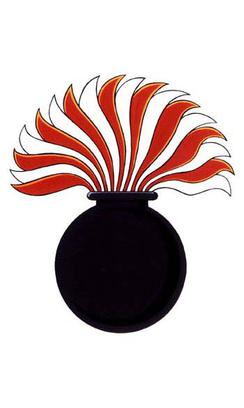Related Research Articles

The Governor General's Horse Guards is an armoured cavalry regiment in the Primary Reserve of the Canadian Army. The regiment is part of 4th Canadian Division's 32 Canadian Brigade Group and is based in Toronto, Ontario. It is the most senior reserve regiment in Canada, and the only household cavalry regiment of Canada's three household units.
The Canadian Expeditionary Force (CEF) was the expeditionary field force of Canada during the First World War. It was formed following Britain’s declaration of war on the German Empire on 15 August 1914, with an initial strength of one infantry division. The division subsequently fought at Ypres on the Western Front, with a newly raised second division reinforcing the committed units to form the Canadian Corps. The CEF and corps was eventually expanded to four infantry divisions, which were all committed to the fighting in France and Belgium along the Western Front. A fifth division was partially raised in 1917, but was broken up in 1918 and used as reinforcements following heavy casualties.

The Royal Hamilton Light Infantry (Wentworth Regiment) (RHLI) is a Primary Reserve infantry regiment of the Canadian Army, based at John Weir Foote VC Armoury in Hamilton, Ontario. The RHLI is part of 31 Canadian Brigade Group, which is part of 4th Canadian Division.

The Nova Scotia Highlanders is an infantry regiment in the primary reserve of the Canadian Army. It is part of 36 Canadian Brigade Group, 5th Canadian Division.

The Loyal Edmonton Regiment , or L Edmn R, is a Primary Reserve infantry unit of the Canadian Armed Forces based in Edmonton, Alberta. The Loyal Edmonton Regiment is part of 3rd Canadian Division's 41 Canadian Brigade Group. They are colloquially known as "The Loyal Eddies".

The Canadian Scottish Regiment (Princess Mary's) is a Primary Reserve infantry regiment of the Canadian Army based on Vancouver Island in British Columbia.

The 181st Battalion (Brandon), CEF was a unit in the Canadian Expeditionary Force during World War I.
The 208th Battalion, CEF was a unit in the Canadian Expeditionary Force during the First World War. Based in Toronto, Ontario, the unit began recruiting during the winter of 1915/16 in that city and the surrounding district. After sailing to England in May 1917, the battalion was absorbed into the 2nd and 8th Reserve Battalions on January 3, 1918. The 208th Battalion, CEF had two Officer Commanding: Lieut-Col. T. H. Lennox and Lieut-Col. W. P. Malone.

The 133rd Battalion, CEF was a unit in the Canadian Expeditionary Force during the First World War.
The 141st Battalion, CEF was a unit in the Canadian Expeditionary Force during the First World War.
The 143rd Battalion, CEF was a unit in the Canadian Expeditionary Force during the First World War. Based in Victoria, British Columbia, the unit began recruiting in 1916 throughout Western Canada. Bantam units were organized to recruit men who were shorter than the standard 5-foot-4-inch (163 cm) height required for joining the army. By the time they were fully formed, however, only about half of the men were under that standard height as they could not find enough short men to enlist.
The 164th Battalion, CEF, was a unit in the Canadian Expeditionary Force during the First World War. Based in Orangeville, Ontario, the unit began recruiting in late 1915 in Halton and Dufferin Counties.

The 199th Battalion, CEF was a unit in the Canadian Expeditionary Force (CEF) during the First World War.
The 215th Battalion, CEF was a unit in the Canadian Expeditionary Force during the First World War.
The 234th Battalion (Peel), CEF was a unit in the Canadian Expeditionary Force during the First World War. Based in Toronto, the unit began recruiting in the spring of 1916 in Peel County. After sailing to England in April 1917, the battalion was absorbed into the 12th Reserve Battalion on April 29, 1917. The 234th Battalion (Peel), CEF had one Officer Commanding: Lieut-Col. W. O. Morris.

The Winnipeg Grenadiers was an infantry regiment of the Canadian Army.

A bantam, in British Army usage, was a soldier of below the army's minimum regulation height of 5 ft 3 in (160 cm).

The 87th Battalion, CEF was a Household Foot Guards infantry unit in the Canadian Expeditionary Force during the First World War.
The 12th Battalion, CEF was an infantry battalion of the First World War Canadian Expeditionary Force.
216th may refer to:
References
- Meek, John F. Over the Top! The Canadian Infantry in the First World War. Orangeville, Ont.: The Author, 1971.